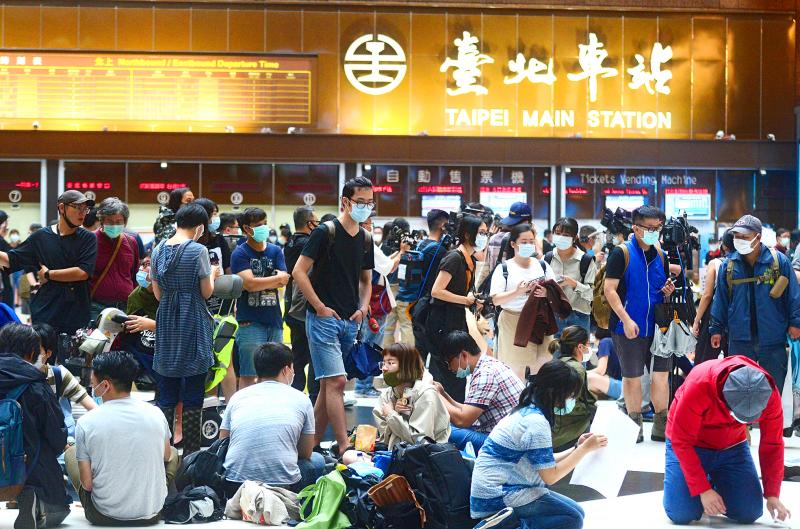More than 400 people yesterday protested at Taipei Railway Station after the Taiwan Railways Administration (TRA) said it would permanently ban sitting on the floor of the station’s main hall.
The protesters were joined by students from Hong Kong who are studying in Taiwan and took the opportunity to support the Hong Kong democracy movement. The students waved Hong Kong independence flags and banners that read: “Liberate Hong Kong, revolution of our times” — the slogan used in Hong Kong social movements since 2016.
“The TRA will gather public opinions and draft plans that facilitate everyone’s needs for the station as soon as possible,” TRA Deputy Director-General Feng Hui-sheng (馮輝昇) said.

Photo: Wang Yi-sung, Taipei Times
In response to the protesters, the station yesterday sent 25 staff members to walk around the main hall with placards reminding people to wear masks and practice social distancing, as required by the government to fight the COVID-19 pandemic.
Twenty railway police officers urged the crowd to disperse as part of disease-prevention efforts, but were ignored by the students and protesters.
In response to media queries on whether the station would issue fines, Station Master Huang Jung-hua (黃榮華) said the station was only urging the protesters to disperse at that point, and was not planning to fine those who refused to leave.
“Taipei Railway Station is an open public space. There has never been a problem with not opening it to the public. It is simply that we are facing a pandemic,” he said, adding that he hoped people would follow the advice issued by the Central Epidemic Command Center.
People often gather in the middle of the hall because there are few other places in the station to sit, one protester surnamed Fan (范) said.
The hall is also used as a gathering place by many migrant workers, demonstrating its importance to Taipei’s multicultural society, he said, adding that the large black-and-white tiled floor is an easy place for people to find when they are meeting.
The main hall is a public space similar to one of the city’s parks, a woman surnamed Yu (余) said.
“Could it be that station authorities feel it is unsightly for people to sit here?” she asked.
The station could consider letting young people use the space to hold activities, she said, adding that she did not feel that people gathering there detracted from the aesthetics of the hall.
“It does not obstruct the station’s ticket sales when people gather here, and sometimes you even encounter different cultures here,” she said.

The Grand Hotel Taipei on Saturday confirmed that its information system had been illegally accessed and expressed its deepest apologies for the concern it has caused its customers, adding that the issue is being investigated by the Ministry of Justice Investigation Bureau. The hotel said that on Tuesday last week, it had discovered an external illegal intrusion into its information system. An initial digital forensic investigation confirmed that parts of the system had been accessed, it said, adding that the possibility that some customer data were stolen and leaked could not be ruled out. The actual scope and content of the affected data

‘LIKE-MINDED PARTNER’: Tako van Popta said it would be inappropriate to delay signing the deal with Taiwan because of China, adding he would promote the issue Canadian senators have stressed Taiwan’s importance for international trade and expressed enthusiasm for ensuring the Taiwan-Canada trade cooperation framework agreement is implemented this year. Representative to Canada Harry Tseng (曾厚仁) in an interview with the Central News Agency (CNA) said he was increasingly uneasy about Ottawa’s delays in signing the agreement, especially as Ottawa has warmed toward Beijing. There are “no negotiations left. Not only [is it] initialed, we have three versions of the text ready: English, French and Mandarin,” Tseng said. “That tells you how close we are to the final signature.” Tseng said that he hoped Canadian Prime Minister Mark Carney

President William Lai (賴清德) yesterday bestowed one of Taiwan’s highest honors on Saint Vincent and the Grenadines (SVG) Ambassador Andrea Clare Bowman in recognition of her contributions to bilateral ties. “By conferring the Order of Brilliant Star with Grand Cordon on Ambassador Bowman today, I want to sincerely thank her, on behalf of the Taiwanese people, for her outstanding contribution to deepening diplomatic ties between Taiwan and SVG,” Lai said at a ceremony held at the Presidential Office in Taipei. He noted that Bowman became SVG’s first ambassador to Taiwan in 2019 and

POSITIVE DEVELOPMENT: Japan and the US are expected to hold in-depth discussions on Taiwan-related issues during the meeting next month, Japanese sources said The holding of a Japan-US leaders’ meeting ahead of US President Donald Trump’s visit to China is positive news for Taiwan, former Japan-Taiwan Exchange Association representative Hiroyasu Izumi said yesterday. After the Liberal Democratic Party’s landslide victory in Japan’s House of Representatives election, Japanese Prime Minister Sanae Takaichi is scheduled to visit the US next month, where she is to meet with Trump ahead of the US president’s planned visit to China from March 31 to April 2 for a meeting with Chinese President Xi Jinping (習近平). Japan and the US are expected to hold in-depth discussions on Taiwan-related issues during the